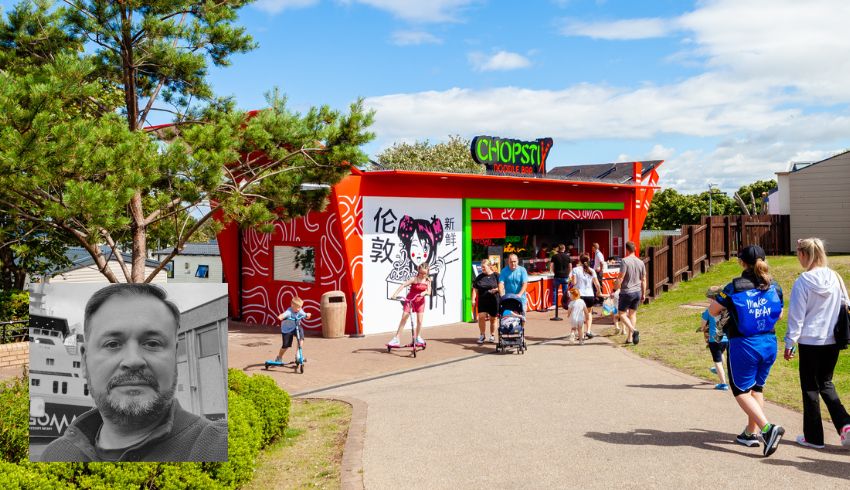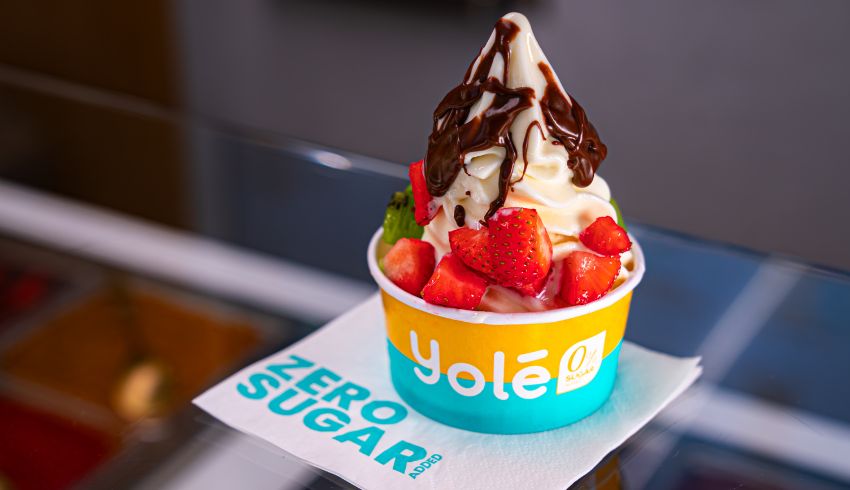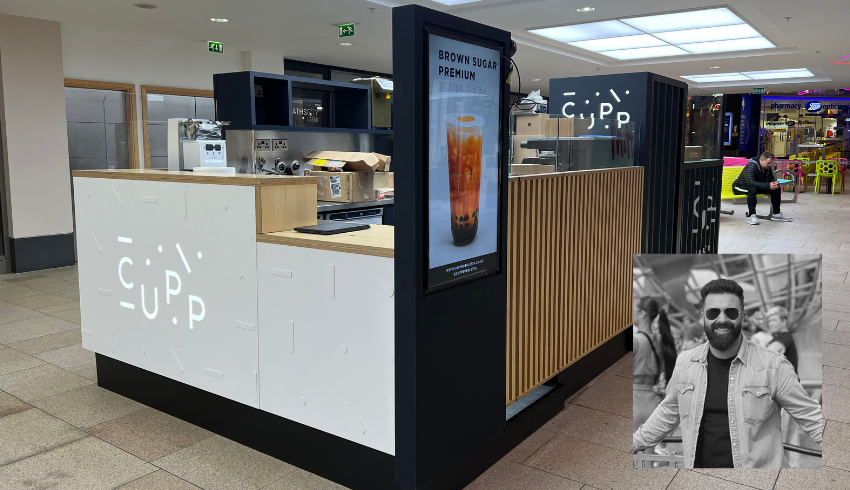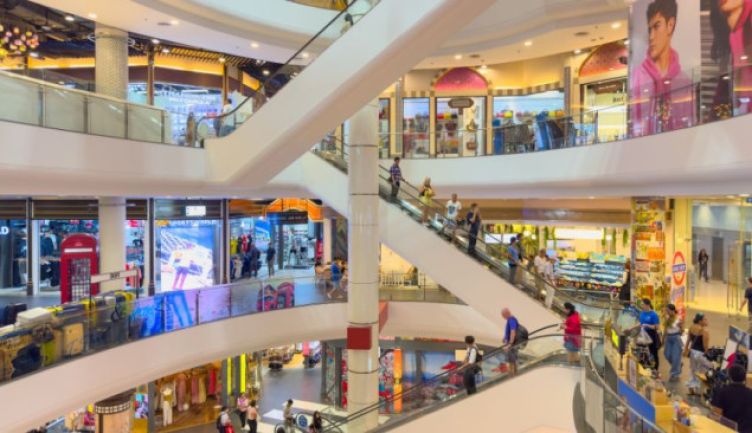The entrepreneurs behind some of the UK's successful kiosk business models share their challenges, wins, and tips to getting it right
Shopping centres, petrol stations, and food markets are rarely without kiosks, poised to capture footfall as it flurries past. For franchisees, this is a cheaper investment option in comparison to a full bricks and mortar store.
However, it still provides all-important access to consumer heavy areas, which makes for strong revenue opportunities. As a result, we’re beginning to see an influx of brands providing a kiosk opportunity. We meet some of the entrepreneurs
who have taken the leap into this space.
Richard Herbert, Chopstix, at Haven Holidays

Richard Herbert isn’t your typical franchisee. The food and beverage manager oversees F&B operations at all 39 Haven Holidays locations across the UK. This includes acting as franchise principle for its five Chopstix kiosks – a relatively new addition to five of its parks which aims to fill the Pan-Asian cuisine gap.
Franchising works for Haven and so far the brand has invested in Papa Johns, Burger King, Slim Chickens, Costa Coffee, and Millie’s, alongside its own in-house business concepts. But it was when Richard was leaving his previous role developing the franchise model for Pizza Express that he stumbled across what would become the holiday resort’s next opportunity.
“I spent some time with John Lake, the MD of Chopstix and Menashe Sadik, one of the founders,” he says. “It was really apparent that the complexity had been lifted out of the franchise option and put into the supply chain, that really resonated.”
The brand’s QSR concept chimed with consumer surveys which indicated an appetite for Asian flavours. But for the franchise to be successful, it had to work with Haven’s big investment in its adventure village – an outdoor space with interconnecting activities with emphasis on being around nature and the coast.
A kiosk (which Haven calls a modular build) lent itself to offering adventurous holidaymakers a quick bite without imposing on the landscape like a bricks and mortar store would.
“During the daytime, when it’s sunny outside, and that does happen on the coast, holidaymakers want to be outside. They want to have a drink outside. They want to have their food outside,” explains Richard.
The ‘modular builds’ at Haven have been purpose made for Chopstix unlike a lot of kiosks which take up pre-existing spaces. In this case, Richard says the investment in modular wasn’t the cheaper option in comparison to a bricks and mortar store.
.jpg)
The first trial location was opened in Craig Tara in Scotland, where there had been strong indication punters were looking for Asian cuisine.
“The modular is movable. It has full power, full drainage, all the prep kitchens are inside,” he says. “All the processes happen here, and we even do deliver from them.”
It was here, Richard and his team encountered the challenges that would feed back into future Chopstix kiosk locations.
“The original modular that we were building for Craig Tara was 12 metres long and we ended up making it 14 and a half metres long due to the cookline,” says Richard. “We have to do the volumes that we wanted to be able to do and serve up to 6000 people a day.”
Another challenge was maximising storage with limited space, which Haven have now resolved by incorporating a chilled walkthrough. “A lot of that learning went into Presthaven and Haggerston Castle and Devon Cliffs.”
Support has also come from Chopstix head office, which conducted training on the site, in turn, avoiding a drain on Haven’s internal resources.
Chopstix has also been amenable to Haven diverging from its usual operating hours, on account that the holiday resort only trades between March and the end of the November, with some parks open over Christmas. However, this is mitigated by the 28,000 holidaymakers that descend upon Haven’s parks each week.
“The reality is that Chopstix operating in Haven Park is not like it operating on a high street. We have a captive market,” explains Richard. So far, reception from Haven has been positive and Richard is open to seeing more modular builds in the future. “We’re massively expanding out estate as we’ve been doing more and more activities outside,” he says.
“We have 39 parks, we have six Chopstix – there is clearly potential there.”
Shamim Miah, Yolé franchisee, London

Business ownership was not a new journey for Shamim Miah when he opened his first Yolé store in London in 2021. The entrepreneur had already owned and operated a retail clothing and confectionary business in Vatican City for several years.
However, when the time came for Shamim to relocate to the UK, he decided to sell some of his Italian portfolio and establish a business on British soil.
“Given my unfamiliarity with the UK business landscape, I found franchising the ideal starting point,” says Shamim, who made the decision to invest in international frozen yoghurt franchise Yolé.
“Initially, I opened a bricks and mortar store as the first UK franchisee of Yolé, located on Shaftesbury Avenue,” he says. “I was enthusiastic about having multiple points of presence, so I decided to complement my store with a kiosk in Westfield, one of the most prestigious shopping centres.”
.jpg)
The Westfield Shopping Centre, located in Shepherd’s Bush, suited Shamim’s strategy to capitalise on high footfall, a diverse consumer base, and a well-loved area.
“Being in a shopping centre offers advantages such as consistent foot traffic, especially during peak shopping times, and a controlled environment that mitigates weather-related issues which can affect outdoor or high street locations,” he explains.
However, despite commercial benefits of setting up shop in a retail hotspot, there have been hurdles. “A challenge has been navigating the restrictions of shopping centre leases and managing the logistics of home deliveries in such environments,” says Shamim.
Opting to lead the charge on Yolé’s UK franchisee efforts, while also navigating the business world in a second language, presented additional challenges, which emphasised the importance of leaning into the brand’s support system.
“As the first franchisee, building brand awareness was a challenge, but with robust marketing support from the franchise and high footfall locations, we’ve achieved success,” he says. “My operations manager has been instrumental in supporting me with translations.”
Now, Shamim’s Yolé stores have continued to see an ongoing increase in demand. “The most rewarding aspect has been the significant year-over-year growth, with 40% increase in May 2024,” he explains. “We have a loyal customer base who love our brand and have their favourite
Tahir Zia, CUPP franchisee, Bradford, Leeds, and Manchester

Tahir Zia is well-versed in what it takes to run a financially successful business, having come from a sales and marketing background which saw him work across multiple sectors. Often, his clients were global giants, and his exposure to the international market prompted him to investigate importing a relatively undiscovered concept into the UK.
“What we wanted to do was bring something back to the UK that was at its infancy here, but we knew globally it was already a big success, which is why we chose bubble tea,” he explains.
Investing in a franchise model suited Tahir and his business partners’ ambitions to scale, and they decided to invest in CUPP.
“It offered a structured path with various different business models which my skill sets and my partner’s skill sets could adapt and follow well, allowing us to focus on growing our portfolio.”
It was decided that opening under CUPP’s kiosk model would be a wise starting point, and soon Tahir opened a kiosk in Broadway Shopping Centre in Bradford – a high footfall area.
“Being our first store we were looking to keep our cost down and, with the kiosk, thought it was a lot cheaper than taking on the store and less risk,” he says. “With a kiosk you can uplift it and move it anywhere you want if it’s not working.”
However, the CUPP kiosk was a success, and has enabled Tahir to open more locations across Yorkshire in kiosk and bricks and mortar stores. Both concepts have proven useful in capturing different types of customers – the grab and goers, and the dine-ins.
“When people are out shopping, they’re grabbing a drink and then they’re leaving. At the same time, where we’ve got stores in Manchester and Blackburn, people want to take a drink and actually sit down, socialise, and meet with friends.”
.png)
The mix of concepts has enabled Tahir to evaluate the different characteristics and challenges with a point of comparison. For instance, the bricks and mortar store is a larger investment but with that comes the space to extend revenue streams by offering additional products like sushi.
Whereas, the low-cost kiosk has been advantageous in capturing passers-by, but also requires an eagle eye on stock on account of there being little space.
“The kiosks are very small and they are basically designed to have your key equipment in, but no storage,” explains Tahir. “So you need to start thinking about how much storage can you hold? Is there a storeroom close to the shops? Operationally we have to be quite smart.”
This has prompted Tahir to act with extreme vigilance – starting his day each morning by looking over the stock, the sales figures, and the staffing rota. If need be, he’ll move things around to ensure no location is out of product.
He also monitors customer reviews, because the openness of a kiosk creates a goldfish bowl, so high standards must be always maintained.
“Everybody’s watching you and everybody can see what’s going on. So, you’ve got to make sure everything’s wiped down if you’re making something fresh and that you’re cleaning up after yourself.”
This customer awareness is something that Tahir believes has been intrinsic to his success with CUPP. “Make sure that the customer is always happy and don’t give them something that you think they’re not going to enjoy,” he says. “Don’t treat them like a one-time purchase.”
Although Tahir has built up enough brand reputation to graduate from kiosks to bricks and mortar stores, he plans to open more kiosk models in the future – as they can be incredibly lucrative in attracting casual footfall.
“The kiosk was a simple operation where it doesn’t require any specialised skills,” he explains. “Once you’ve offered the training, it can be self-managed and that’s something that really attracted us.”
Hanifah T, marketing director at The Knot Churros, London
_1.jpg)
Kiosks were never on the cards for The Knot Churros. The luxury churro brand is a somewhat newcomer to the franchising space, having been cultivated by Anisah T and her sister Hanifah over the past few years.
The business proposition had always been a dine-in restaurant experience centred around what the brand markets as the ‘world’s first churros afternoon tea’. However, when the offer came to open a pop up in Westfield White City – Western Europe’s largest indoor shopping centre – the duo decided they couldn’t turn down the opportunity.
“We thought this might be a good opportunity to see how a kiosk would work as a concept type,” says Hanifah, director at The Knot Churros. “However, the biggest concern was that people weren’t going to stop by because our concept wasn’t grab and go.”
Hanifah and Anisah set about adapting the brand to appeal to customers on the move – putting heavy focus on its glazed churro boxes, hot drinks, and takeaway milkshakes, as opposed to its sit-down afternoon tea experiences.
“After three months of operating, we’d done extremely well,” says Hanifah. “We even brought more footfall to the area where Westfield had put us.” The positive reaction from shoppers, confirmed that making the kiosk permanent was the right choice.
It also indicated that making the kiosk concept available to franchisees could be a good move as The Knot Churros looks to expand. “For franchisees, it’s definitely a great way to get your foot in the door when starting a franchise as it’s lower risk and low cost,” says Hanifah. “We always recommend this if you haven’t had the food and beverage sector experience.”
.jpg)
For the Westfield kiosk, it was decided to keep the location corporate-owned so the team could decipher the challenges that come with the business model, before encompassing the solutions into a franchise package. One such learning was the importance of aesthetics, especially for a brand that has built a big following from social media activity.
“We didn’t initially invest that much into the interiors,” says Hanifah. “Now we’re there permanently, we’ve invested in it more. We’ve definitely seen an increase in revenue, our sales have doubled just from our redesign.”
Having had the opportunity to witness the impact of positioning a brand in a busy walkthrough area has also confirmed that opening up in the right place is vital. “You 100% have to be very strategic with the locations that you choose,” confirms Hanifah.
“You need to be somewhere which is going to have a good amount of footfall and will showcase your brand. The kiosk option is now a big part of the franchise, however, we’re still very specific about the area.”
The marketing director, who has built up 282k Instagram followers for The Knot Churros, adds that its success has been truly underscored by a solid brand presence online. This has coaxed customers to stop off at the kiosk, having recognised their brand from social media.
“If you’re going to invest in a kiosk franchise, it’s definitely worth taking the time to find the correct brand and correct location,” says Hanifah. “Even if you have a great location with great footfall, if you don’t have brand awareness, it’s going to be difficult to bring people through the door.”
For The Knot Churros, the venture into kiosk franchising has become part of the brand’s wider growth trajectory. It now plans to open another grab and go concept later this year as well as appeal to franchisees looking to invest.
Main image credit: Elias_Bitar/Shutterstock


















_59_59_80_s.jpg)





_59_16_80_s.jpg)
_59_58_80_s.jpg)







